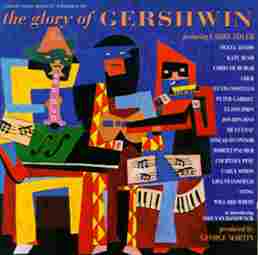The Free-Reed Review
Critiques of Compact Discs, Books and Music Scores
CD Review: Larry Adler

featuring
Larry Adler, harmonica
total time: 78:01
released: 1994
label: Mercury (522 727-2)
|
The Glory of Gershwin
A Tribute to Larry Adler's 80th Birthday
Produced by George Martin
Program:
- Peter Gabriel: Summertime
- Chris de Burgh: Do What You Do
- Sting: Nice Work If You Can Get It
- Lisa Stansfield: They Can't Take That Away From Me
- Elton John: Someone To Watch Over Me, Love Is Here To Stay
- Carly Simon: I've Got A Crush On You
- Elvis Costello: But Not For Me
- Cher: It Ain't Necessarily So
- Kate Bush: The Man I Love
- Jon Bon Jovi: How Long Has This Been Going On
- Oleta Adams: Embraceable You
- Willard White: Bidin' My Time
- Sinead O'Connor: My Man's Come Now
- Robert Palmer: I Got Rhythm
- Meatloaf: Somebody Loves Me
- Issy Van Randwyck: I'll Build A Stairway To Paradise
- Courtney Pine: Summertime
- Larry Adler and George Martin: Rhapsody In Blue
|
Review by Henry Doktorski:
Larry Adler personally told me the story of his first performance of
George Gershwin's Rhapsody in Blue:
"I was at a party in New York in 1934 when the host, Jules Glaenzer—the president of Cartier Jewelers—suddenly announced "Now Larry and
George are going to play the Rhapsody in Blue." Glaenzer didn't
even know if I knew the Rhapsody, but he announced it anyway. I had never
played it before, but I had heard the piece several times, so I was
confident that I could play it without rehearsal.
"So George sat at the piano and I started to play the Rhapsody, and it
was as if two people had known each other all their lives; we played the
Rhapsody all the way through and when we finished it, George got up, put
his hand on my shoulder and said, 'You make the god-damned thing sound
like I wrote it for you!'
"From then on I was friends with the Gershwin family for the rest of
George's life and for the rest of Ira's too."
Rhapsody in Blue is the crowning glory of this album; the longest
piece (8.5 minutes—abridged version) and the only instrumental work on
the CD. Throughout the entire 78 minutes (talk about value for your
money!) Adler and the singers are accompanied by a studio symphony
orchestra directed by George Martin.
Every track on this album is superb, what else can one expect with such
world-class artists as Elton John, Carly, Simon, Elvis Costello, Sting,
etc. and arrangers such as George Martin (who also arranged for the
Beatles), Graham Preskett and Michael Gibbs? Adler told me that the two
million-plus sales of this 80th birthday tribute album put him in the
Guiness Book of Records: the oldest artist to record a hit album.
Born in Baltimore in 1914, he briefly attended the Peabody Conservatory of
Music but was kicked out for playing Yes, We Have No Bananas
instead of Grieg at a recital. After winning a harmonica contest in his
teens, Larry Adler ran away to New York to develop his career. He got his
first break when Rudy Vallee agreed to put him on at his club. In time,
he became a success, rubbing shoulders with Al Capone in Chicago, making
up tennis foursomes with Charlie Chaplin, Greta Garbo and Salvador Dali in
Beverly Hills and travelling to Europe, where the French composer Maurice
Ravel left provision in his will for Adler to be allowed to perform
Bolero whenever he liked, without paying royalties.
The McCarthyite witch-hunts blacklisted Adler and he was summoned (along
with many distinguished showbiz personalities) to appear before the Senate
Un-American Activities Committee. He refused.
In 1949 he was obliged to relocate in England where he was already
popular. Finally, having been mistaken for a member of the Communist Party
of America named Leonard Adler, Larry was forced to surrender his American
passport. His vocal opposition to the Vietnam War in the Sixties set the
seal on matters. He said, "I lost respect for a government that could
permit such things to happen to its citizens. I lost respect and I'm
afraid I didn't regain it."
In April 1994 Adler triumphantly returned to America and has since been
concertizing once again in the country of his birth. I met him during his
four-concert performances with the Pittsburgh Symphony Pops Orchestra.
Adler's playing is quite spectacular considering his age, despite some
apparent difficulty with one particular ascending chromatic scale in
The Rhapsody. I believe that this is one CD harmonica lovers will
treasure.
